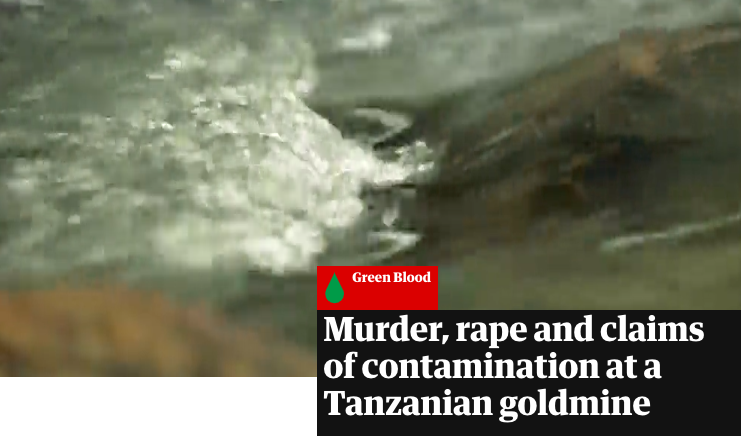RAID Rejoinder to Acacia Mining’s press release
On 26 June 2019, Acacia Mining Plc issued a press release in response to articles published by the Guardian and other Forbidden Stories journalists on the human rights situation at Acacia’s North Mara gold mine in Tanzania. Acacia asserts that these articles are ‘misleading’ which it partly attributes to publications by RAID. We take this opportunity to address Acacia’s inaccurate response.
Acacia bases its response to the press articles on three claims:
Claim 1 – Acacia says the articles concern ‘historical’ allegations, ‘focus[ing] primarily on events in 2011’ or earlier.
Not true. The articles do not concern ‘historical’ incidents. They refer, for example, to 22 killings documented by RAID and MiningWatch Canada at or near the mine in security operations between 2014 and 2016. More recent incidents are also referenced, including the killing of a man on the mine site in 2017 and the shooting of a student in 2018. Incidents within the past five years can certainly not be defined as ‘historical.’
Moreover, Acacia’s efforts to portray the human rights situation at North Mara as a legacy issue are not only inaccurate, but inappropriate. Those who have had limbs broken in beatings, suffered gunshot wounds, sustained head injuries or amputations, and/or been paralysed, all suffer on a daily basis and will continue to do so. Bereaved families continue to suffer psychological and material harm. Insisting that such harms are ‘historical’ disregards such experiences.
Claim 2 – Acacia says it is ‘not accurate to portray the Mine as a place of ongoing violent confrontation and death’, as there are ‘few’ interactions between police/mine personnel and ‘intruders’ or new allegations of excessive force.
Not true. Acacia’s claim is contradicted not just by the recent incidents mentioned above, but also by the company’s own statements. For example, on 13 June 2019, less than two weeks prior to Acacia’s press release, the General Manager of the North Mara Mine wrote to RAID referring to a ‘violent invasion’ at the mine site on 31 May 2019 and to the discharge of smoke canisters and ‘other such cartridges’ by security personnel. The General Manager also acknowledged claims concerning the killing of a child by a mine vehicle in July 2018 and injuries suffered by four women in the aftermath. Moreover, Acacia’s 2018 annual report records 18 grievances concerning ‘security and human rights’ registered in that year alone, disproving its claim that there are ‘few’ new allegations of excessive force.
Acacia also acknowledged 32 ‘intruder fatalities’ between 2014 and 2016, and its own statistics show that while the number of ‘intrusions’ may have decreased, the proportion of ‘intruder’ deaths (from all causes) relative to the number of people entering areas where mining operations are ongoing has increased significantly (from one death out of every 5,052 ‘intruders’ in 2014 to one out of every 316 in 2018). This is particularly concerning given the manner in which Acacia categorizes the deaths and the company’s refusal to provide additional clarification, despite requests from RAID. Acacia attributes the deaths to: ‘fall from height’; ‘infighting’; ‘drowning’; ‘rockfall’; ‘vehicle accident’, and ‘other’. RAID has received disturbing reports from individuals that security patrols have dropped rocks on people and specifically beaten people in such a manner as to avoid causing tell-tale injuries to the head and face. RAID is also aware of two more incidents within the last year involving a security-related death and injury which the Mine has categorised as ‘accidental’.
Claim 3 – Acacia says the Mine has taken steps to support respect for human rights.
If true, Acacia has provided limited evidence to support its claim. Acacia says that North Mara Gold Mine Ltd, has taken ‘many steps’ in its ‘commitment to meet the Voluntary Principles on Security and Human Rights (VPs) and the United Nations Guiding Principles on Business and Human Rights’. Yet neither the North Mara mine nor Acacia is a participant in the VPs. Further, under the Mine’s Memoranda of Understanding with the Tanzanian police, it pays, accommodates and equips the armed police, and coordinates their participation in joint security patrols on and around the mine. In this and other key respects, the Memoranda of Understanding disregard the VPs’ model clauses and heighten the risk of human rights violations.
In addition, the Mine’s grievance process, which should enhance access to remedy in accordance with the UN Guiding Principles, is far from compliant with those principles. By Acacia’s own count, it has denied over 80% of claimants any remedies at all, and is subjecting such claimants to a humiliating and disempowering process.
If Acacia would ‘like to clarify the situation’ as it states in its press release, it should be transparent. Yet to date the company continues to refuse to publish key documents or information. Acacia has not pushed for the full publication of the findings of the 2016 Tanzanian Parliamentary inquiry documenting reports of 65 killings and 270 injured people by police jointly responsible for mine security at North Mara. It has not clarified the causes of deaths on the mine site nor has it published information on serious injuries suffered by local residents at the hands of its security personnel and police. It has not been transparent about its security arrangements, failing to publish its latest Memorandum of Understanding with the Tanzanian police and the company’s Mine Investigation Policy, according to which it investigates incidents at the mine. And it has failed to publish human rights information about its grievance process that would enable independent scrutiny.
If Acacia is to meet its human rights responsibilities, it should stop treating ongoing issues as ‘historical’, make its remedy process at North Mara fit for purpose, and act to end its security arrangements with the Tanzanian police that give rise to the abuses in the first place.

